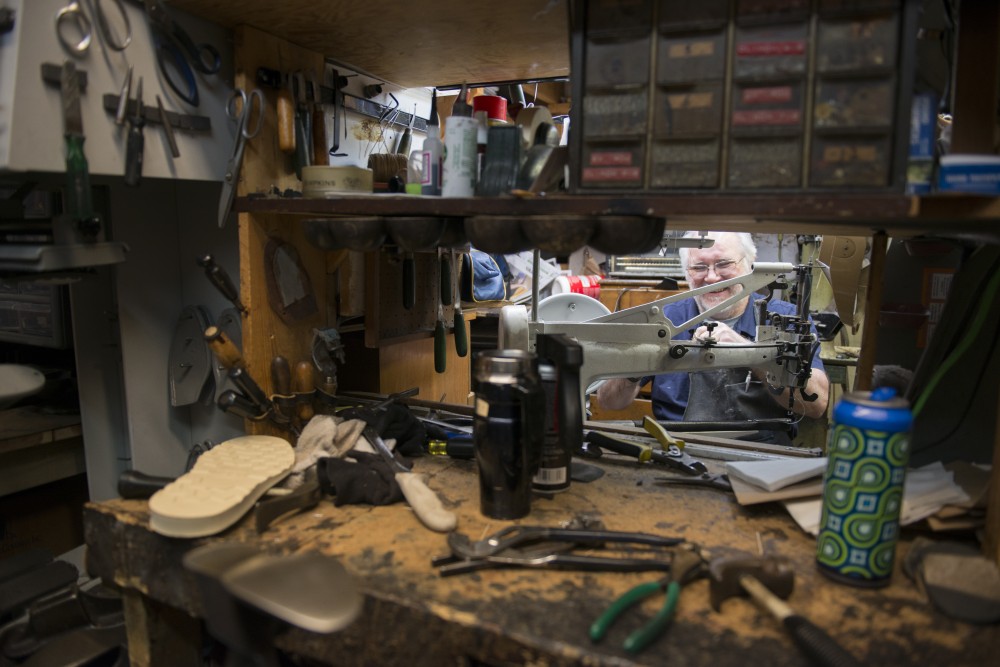At Fast Eddie’s Place, hundreds of Birkenstock sandals, high heels and leather loafers line the shelves behind the front counter and in the back room.
From that back room down the hallway of Dinkydale Mall, shoe repairman Jim Picard can only tell a customer has entered by the light of a motion-activated bulb.
“When the machines are running and I turn up the music so I can hear it over the machines,” Picard said. “You could stand out there and scream. I wouldn’t hear a thing.”
A Claes Patching Machine, Landis Aristocrat Stitcher and a Birkenstock foot bed press are just a few of the vintage machines Picard uses to patch, glue, grind, sew and repair anything that comes through the door.
Fit snuggly in the room — about 6 feet high and 5 paces wide — the repairman has had all his repair necessities at his fingertips for more than 30 years.
When leather grows worn and stringy, it breaks and needs a patch sewn and glued in.
When heels and soles get worn down, he’ll sand and attach new ones with curved cobbler nails and tacky glue.
When puppies sink their teeth into footwear, he’ll fix the damage and explain ways to prevent it from happening again.
In addition to shoes, Picard will give almost anything a go, whether it’s re-sewing a purse strap, making keys or something far and in-between.
Sometimes, Picard will stay and work for hours after closing time to ensure everything leaves better than how it came in — within a week.
“I try not to say no,” he said about scheduling his many projects. “But … I can’t make glue dry any faster.”
In the shop
The salesman-turned-cobbler said he never imagined himself where he is today.
Fast Eddie’s original owner, Eddie LaPlante, didn’t see him there either.
When LaPlante was unable to serve in World War II because of flat feet, he started fixing shoes. He opened his own repair shop since shoes were so hard to come by at the time.
After Picard, who worked at a nearby shoe store, covered for LaPlante when he was sick, things started to fall into place, and Picard bought the store in 1985. LaPlante continued to work with him and pass on all he knew about the trade.
“The craft of it got me,” Picard said. “I turn out a product up front that I’m proud of. I feel good about it, and there’s a lot to be said about that.”
Picard said it took him about five years to see every problem and repair come through the door at least once.
For Richard Casey of Northeast, the expertise at Fast Eddie’s is what keeps him coming back — especially with his limited edition shoes.
Picard has done a lot for Casey: he’s widened a pair of limited cut Red Wing Irish Setter Boots, he’s explained why to avoid putting mink oil on his boots, he’s even punched a new lace hole for Casey’s limited edition Converse “Weapon” basketball shoes.
“I can’t even tell which [eyelet hole] he did,” Casey said. “I appreciate someone like that where they have the knowledge and gift of being that good at something.”
And with all Picard’s learned, he’s heard his fair share of shoe puns.
“We have all the old shoe jokes,” he said with a bit of a laugh. “I will heel you … I will save your sole … I will even dye for you.”
The next step
Despite being slightly tucked away down the hallway of Dinkydale Mall, the store continues to succeed. Picard said people come to him because they love their stuff and don’t want to buy another pair.
That’s where the demand of his skills comes into play.
“No one’s producing new shoe repairmen,” Picard said. “This is an industry where people are older, and there are fewer and fewer people who can do the trade as the years go on.
“I feel like a lucky person,” he said. “When the internet took over the shoe business and Walmart came and took over all the stores … they can’t do this. They can’t compete with me.”
But the hours of intricate and hands-on work are hard. Picard wishes to someday pass on what he’s learned.
“I’m hoping to become Eddie,” he said. “Hopefully in the next five years or so I can find someone who wants to take over, and I’ll hang around and teach them like he did for me.”
Until then, he will continue to listen to blues music in the back room — fixing and repairing hundreds of shoes every week.
“If I can fix it, I will.”














